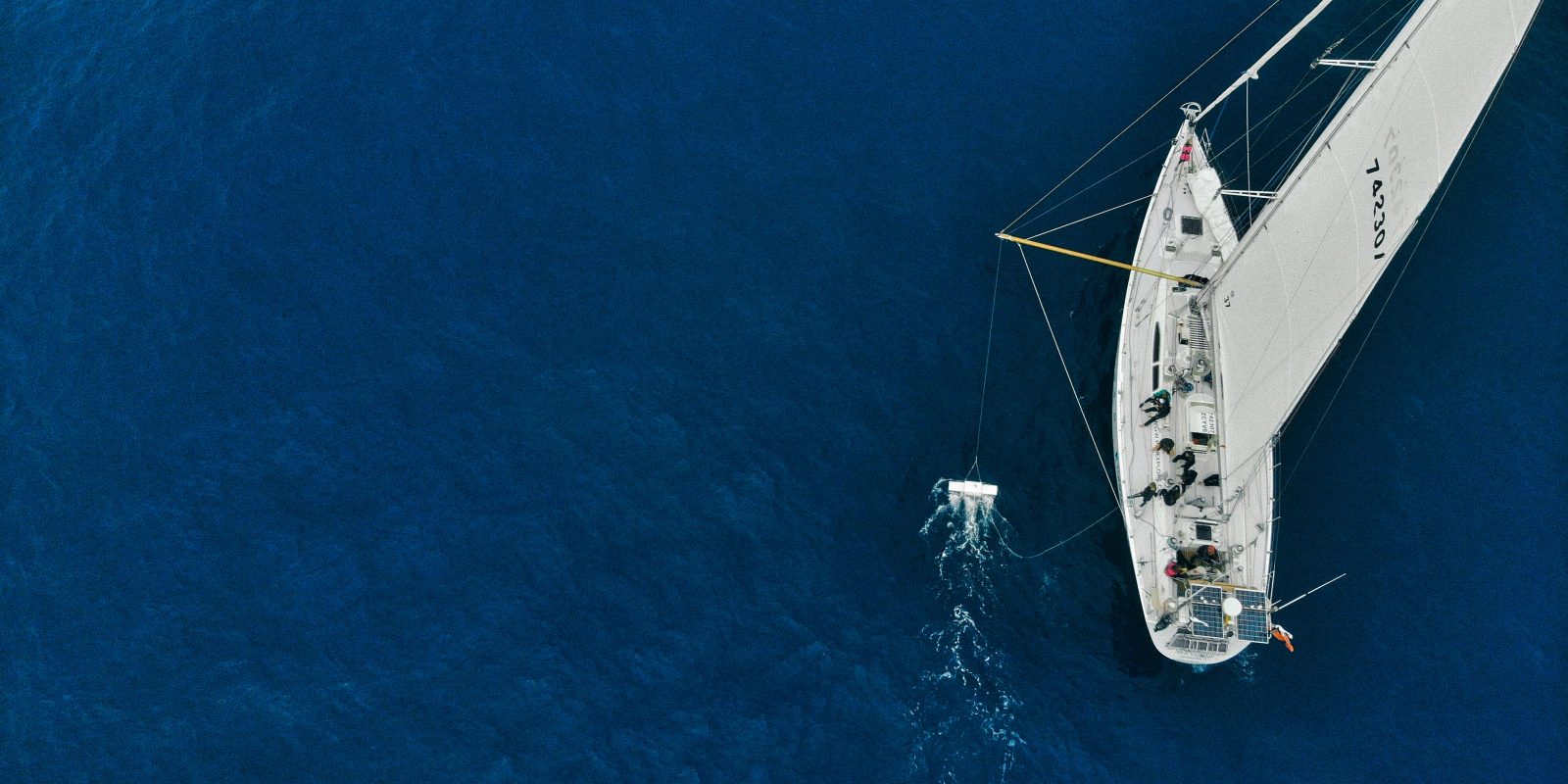
Introducing Natasha Pergl – Global Circular Economy Lead at global software company SAP. Natasha joined us as part of our Round the World Leg 7 crew on a voyage from Galapagos to Easter Island.
Natasha is working together with business, partners and NGO’s to support a cleaner ocean by 2030 and develop the industry solutions needed to eliminate waste, keep products in use in long as possible and transition to circular business practices. We wanted to find out more about how Natasha’s superpower has allowed her to create impact at SAP.
As part of our Ambassador Spotlight Series we wanted to showcase Natasha’s change-making journey. Scroll to read Natasha’s Superpower Story and find out what steps Natasha and SAP are taking to secure the future health of our ocean.
Where did your interest in plastic pollution come from?
My interest in plastic pollution grew as I became more aware of the problem from watching documentaries like Blue Planet and reading books and articles. Through my work, SAP has exposed me to the issue of plastic pollution and the role of technology and innovation. Driving planetary impact is at the heart of everything we do. Three years ago SAP set a Plastic Challenge in the UK to think about how we could tackle this huge issue and since then, we’ve spoken to 100s of customers and NGOs to understand what change is needed to address our collective waste crisis. I am really excited about the role that SAP can play, using the insights we have already on global material flows and think this provides a great platform to make a difference.
What is your mission at SAP, what are you hoping to achieve?
Our 2030 Clean Ocean mission and being impact-led is our driving force. This is a core part of our brand at SAP who have been No 1 software company in the Dow Jones Sustainability Index for the last 14 years.
As a technology company we want to run our own operations sustainably, but are equally focused on enabling our customers to be more sustainable and embed this into everything they do.
Our Circular Economy Program is focused on supporting regenerative business and creating solutions that will help industry reduce waste, circulate materials to keep them in use as long as possible and support new circular business models. Our first solution launches in November which is really exciting!

What role does technology and SAP specifically, have to play in tackling plastic pollution?
The key point here is data and insights. As the world’s largest enterprise software company, 77% of the world’s insights around material flows today exist in an SAP system. This gives us great exposure to the lifecycle of materials throughout the current supply chain and how we can shift from the take-make-waste linear system that exists today to a more circular model .
However, the biggest challenge to achieving this is collaboration across the supply chain.
 Currently, different businesses, operating at different levels of the supply chain may be doing their bit to improve the sustainability of their internal operations, but may not be communicating that to the other key stakeholders in the supply chain.
Currently, different businesses, operating at different levels of the supply chain may be doing their bit to improve the sustainability of their internal operations, but may not be communicating that to the other key stakeholders in the supply chain.
With our insights, and the more holistic system perspective that provides, SAP can be a key player in building connections between these different parties. By sharing those broader ecosystem insights we can foster that all important collaboration. As a result, hopefully we can make the waste system more efficient, more circular, and create the changes we want to see.
How did you come to be on the boat for Leg 7 of the Round the World voyage?
SAP is one of eXXpedition’s key partners and in support of our Clean Ocean mission, I was able to join Leg 7 from Galapagos to Easter Island. It was really important for us at SAP, that we had eyes on the ocean and understood what materials were ending up on the ocean and the reality of what was happening. eXXpedition was the perfect opportunity to do that and get firsthand experience.


How did you feel stepping onto the boat?
I was really excited to step onboard, meet my fellow all-female crew and think about the voyage we had ahead of us. I was nervous beforehand because I’ve never been sailing before althoughI’m always up for stepping outside of my comfort zone. Having seen the beautiful beaches of Galapagos littered with microplastics washed up from the ocean, I was keen to start sailing and understand what was lurking beneath the water and how we might do something about it back on land when I returned home.

How did you feel after completing your voyage? Was there something you were particularly struck by?
The whole trip was pretty transformative for me. Firstly, I think that came from experiencing what it really meant to live responsibly and resourcefully. On the boat, living as a sailor, you were always conscious of your decisions – whether that be the energy you’re using on board or the waste you are producing and disposing of. My entire consumption pattern was suddenly forced to be so much more mindful. So for me, the boat became this microcosm for how we should be living back on land – responsibly and resourcefully.
Secondly, seeing the impact plastic pollution is having on island communities, like Easter Island, firsthand, made the problem very real to me. Visiting the Island and speaking to the community living there, taught me just how important the ocean is to them. The ocean is literally their home and they’re really proud of it. They respect it.
The boat became this microcosm for how we should be living back on land – responsibly and resourcefully.
Even though they were amazed and encouraged by what we were trying to do at the same time you could see how much the situation saddened them – to see their beaches disrespected in the way that they have been.
I think seeing that emotion from the Islanders first hand, sent me home with a newfound energy and passion to really try and make a difference. I’m just so happy that now my day job is dedicated to fixing this problem. And yes, sometimes it does feel hard, and complex, and as if there is no end to it, but the excitement in knowing that we are making some sort of difference is motivation enough.

As you say, it is easy to get overwhelmed by the enormity of the crisis – what advice would you give to someone who wants to make a difference but is unsure where to start?
As an individual, or someone that wants to make a difference, I think the first thing to do is really educate yourself about the problem. It’s important to understand what’s happening and how you can contribute and change daily habits at home or as part of your job. It becomes easier to know what aspect of the solution to be a part of, once you understand the problem more deeply.
I think it’s important to be hopeful – the world’s best scientists, academic thinkers, technologists are often optimistic although as we’ve seen in the latest IPCC report, we need to act urgently.

If you had to summarise eXXpedition in three words, what three words would you use?
Inspire. Empower. Impact.

What would you describe your superpower to be, did eXXpedition help you to discover that, and how has it enabled you to make a difference?
I’ve always been a curious person. I’ve always felt like I have the ability to connect ideas, and connect people. Given this, it’s particularly suitable that SAP acts as this connector for business as well. Being able to bring together different parties all across the ecosystem to make a difference through technology and innovation is just amazing. To be able to have that kind of connector role as part of my day job suits me down to the ground.
Being able to bring together different parties all across the ecosystem to make a difference through technology and innovation is just amazing.

What has been your proudest achievement since returning from your voyage and coming back to work at SAP?
I think what I am proudest to have achieved is being part of the team that is creating technology solutions together with customers that help embed sustainability into the core of their business and sharing the knowledge I learned from my time at sea.
Our first solution will go live to market in November 2021, marking a prominent milestone for SAP. I am really proud to think about all the different people we have coordinated with to make this happen. At SAP we can help to put insights into the hands of the right decision makers.
I’m also proud that we supported the launch of eXXpedition’s SHiFT platform which helps people find their role in tackling plastic pollution and navigate lots of different solutions.

What is the message you would like the world to hear?
I’m going to borrow the words from David Attenborough when he addressed the leaders of the G7 summit a few months ago in the UK. He said:
“We have the skills to address climate change and time. All we need is the global will to do so.”
Photo Credits
Thanks to:
Natasha Pergl, Helen Morris, Carry Somers, Lynsi Wavra, Irina Maria Peterson, Alice Pelton, Juliana Corrales, Tavake Pacomio, Marena Brinkhurst





